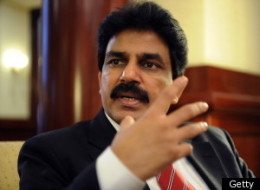Pakistan minorities minister killed Pakistani Taliban claim responsibility for the shooting attack that killed Shahbaz Bhatti, the only Christian minister.
ISLAMABAD, March 2 (Reuters) - Pakistani Minister for Minorities Shahbaz Bhatti, who has been calling for changes in the country's controversial blasphemy law, was killed in a gun attack in Islamabad on Wednesday, a hospital official said.
Police said the shooting had taken place in an Islamabad neighbourhood and were still confirming whether Bhatti, the only Christian in the Pakistani cabinet, was the intended target.
The anti-blasphemy law has been in the spotlight since November when a court sentenced a Christian mother of four to death.

 |
| Bhatti, seen in this file photo with family members of Asia Bibi, sentenced to death under the blasphemy law [EPA] |
Pakistan's minister for minorities has been shot dead by armed men in Islamabad.
An official at the Pakistani capital's Shifa Hospital said Shahbaz Bhatti arrived dead after Wednesday's attack, in which his driver also got wounded.
Police said they were still confirming whether Bhatti, the only Christian in the Pakistani cabinet, was the intended target.
He had been threatened by Muslim religious groups in the past because he had spoken out against the country's controversial blasphemy law.
The politician had just pulled out of the driveway of his parents' house when three men standing nearby opened fire, said Gulam Rahim, a witness.
"The initial reports are that there were three men who attacked him. He was probably shot using a Kalashnikov, but we are trying to ascertain what exactly happened," said Wajid Durrani, Islamabad police chief.
"They asked the driver to get out of the vehicle and then peppered the minister with bullets," Al Jazeera's Pakistan correspondent, Kamal Hyder, reported from Islamabad.
"He was on his way to a cabinet meeting," Hyder added.
 |
| Bhatti's vehicle was left shattered with bullet holes [EPA] |
Durrani insisted that Bhatti had been provided with proper security, but said the minister was not accompanied by his security detail when the attack happened.
Our correspondent said that, "there are big question marks over security here in Pakistan".
'Death threats'
The anti-blasphemy law has been in the spotlight since November when a court sentenced Asia Bibi, a Christian mother of four, to death.
On January 4, Salman Taseer, the governor of the most populous province of Punjab, who had strongly opposed the law and sought presidential pardon for Bibi, was gunned down by one of his bodyguards.
"During this Bibi case I constantly received death threats. Since the assassination of Salman Taseer... these messages are coming to me even publicly," Bhatti said after the governor was shot dead.
But he had insisted that he would work as usual. "I'm not talking about special security arrangements. We need to stand against these forces of terrorism because they're terrorising the country," Bhatti told AFP news agency at the time.
"I cannot trust on security.... I believe that protection can come only from heaven, so these bodyguards can't save you."Al Jazeera's Hyder said it is most likely that Bhatti was assassinated "because of his involvement in the recommendation to amendments to the blasphemy law.
"It shows that nobody is secure in this country, although Bhatti had received many death threats, due to the blasphemy law row".
The Pakistani Taliban have claimed responsibility for the attack.
Earlier, private Pakistani TV channels showed pamphlets at the scene of the killing that were attributed to the Pakistani Taliban warning of the same fate for anyone opposing the blasphemy laws.
Pakistan's Dawn newspaper reported on its website that government leaders had condemned the killing.
"This is concerted campaign to slaughter every liberal, progressive and humanist voice in Pakistan," Farahnaz Ispahani, an aide to Asif Ali Zardari, Pakistan's president, said.
"The time has come for the federal government and provincial governments to speak out and to take a strong stand against these murderers to save the very essence of Pakistan."
No comments:
Post a Comment